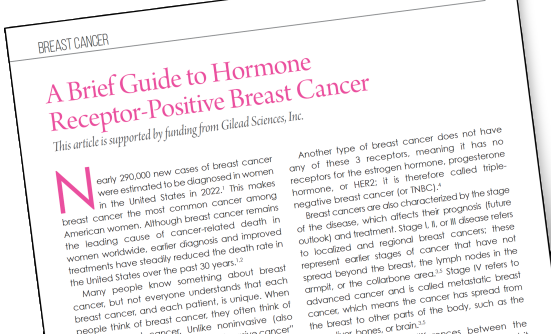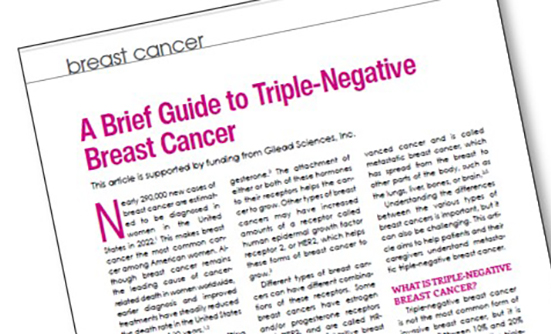While we do not know what causes most breast cancers, we do know that a small percentage (5%-10%) of women develop a breast cancer due to a genetic abnormality—or mutation—that has predisposed them to develop that breast cancer.1 The most common genetic mutations associated with breast cancer risk are called BRCA1 and BRCA2. There are other less common genetic abnormalities, including PALB2, CHEK2, and ATM, that are also associated with an increased risk for breast cancer. Today’s standard multigene testing typically include all of these genes related to breast cancer.
Who Should Be Tested?
Current guidelines include criteria for undiagnosed (unaffected) and diagnosed (affected) women.2 An unaffected individual should be tested if they have (a) 3 or more relatives who have had breast cancer at any age (or 1 relative under age 45 years) on either the maternal or paternal side of their family; (b) 1 relative with ovarian cancer; (c) 1 relative with pancreatic cancer; (d) 1 relative with metastatic prostate cancer; (e) 1 male relative with breast cancer; or (f) have Ashkenazi Jewish heritage along with a family history of an associated cancer. All of the above criteria apply to a woman diagnosed with a breast cancer, with a few additions, including a personal diagnosis of triple-negative breast cancer at or before the age of 60 years, only 2 or more relatives affected by breast cancer on either the maternal or paternal side, or a personal diagnosis at or before 45 years of age.
Why Does It Matter?
BRCA1 and BRCA2 increase a woman’s lifetime risk for breast and ovarian cancer, with up to a 57% probability of developing breast cancer and a 40% chance of developing ovarian cancer by age 70 years.3 Given this information, it could be recommended for an unaffected woman to consider increased screening, preventive medication, or preventive surgery.2 For a woman beginning a journey following a breast cancer diagnosis, this information could impact her surgical decisions to include mastectomy to reduce her risk for recurrence of another breast cancer. Recommendations may also include interventions to reduce other cancer risks once she has completed her breast cancer treatment.
Most BRCA mutations are familial, or inherited, so another very important reason for testing is that when someone has a confirmed BRCA mutation, we know that the people most closely related to them genetically—their siblings and their children—have an approximately 50% risk of having that same genetic abnormality. In short, it can affect some of the people most important to a patient. In general, family members only need to be tested if a BRCA mutation is found.
In addition, there are new studies indicating that BRCA mutations may imply a sensitivity to certain drugs called PARP inhibitors. That information may guide drug therapy recommendations in certain breast and ovarian cancer patient populations but are not currently recommended for newly diagnosed, early-stage breast cancer patients.4
References
- National Cancer Institute. Population estimates of the likelihood of having a BRCA1 or BRCA2 pathogenic variant. www.cancer.gov/types/breast/hp/breast-ovarian-genetics-pdq#_113_toc. 2019.
- National Comprehensive Cancer Network. www.nccn.org/professionals/physician_gls/pdf/genetics_screening.pdf. 2019.
- Walsh MF, Nathanson KL, Couch FJ, Offit K. Genomic biomarkers for breast cancer risk. www.ncbi.nlm.nih.gov/pmc/articles/PMC5016023. 2017.
- OncLive. www.onclive.com/web-exclusives/fda-approves-talazoparib-for-brcamutated-her2negative-breast-cancer?eKey=c9c5e2048af befe9f44b01631bdc816d&utm_medium=email&utm_campaign=OncLiveBreakingNews-10-16-18&utm_content=OncLiveBreakingNews. 2018.















